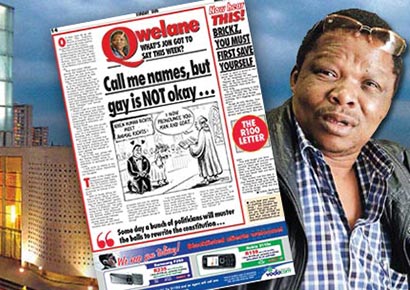Move to appeal Jon Qwelane hate speech trial shock postponement
 One of the groups involved in the hate speech case against homophobic former journalist Jon Qwelane says it will appeal the unexpected postponement of his trial.
One of the groups involved in the hate speech case against homophobic former journalist Jon Qwelane says it will appeal the unexpected postponement of his trial.
On Monday, the South Gauteng High Court agreed to postpone the matter indefinitely because Qwelane claims to be in such ill health that he cannot attend the trial.
He is being sued for hate speech by the SA Human Rights Commission over an article he wrote eight years ago. While he was found guilty in 2011, Qwelane has challenged that ruling on the basis that the Equality Act, under which he was convicted, violated his right to freedom of speech.
It’s been revealed that on the eve of Monday’s court hearing, Qwelane presented himself in person at a police station in Dawn Park to commission an affidavit applying for a postponement. Qwelane claimed that he was unable to appear in court due to a progressively degenerative medical condition.
The Psychological Society of South Africa (PsySSA), which is a “friend of the court” in the case, said it was “shocked and dismayed” at Monday’s postponement, which it called a “denial of justice”.
The group complained that Judge Moshidi refused to allow both it and the SAHRC to submit affidavits opposing Qwelane’s application. It also argued that the court had not considered all the relevant facts as to whether Qwelane is indeed unfit to appear in court, and, if so, whether there are other means through which his testimony might be given.
“By implication, the postponement was granted without the full facts having being objectively considered”, commented Kerry Williams, partner at Webber Wentzel and PsySSA’s attorney.
The granting of the indefinite postponement means that Qwelane is highly unlikely to ever be held to account, publicly, for his hate speech. PsySSA said that the court had thus given more consideration to Qwelane’s claims of ill health, than to the infringements of the rights and well-being of the LGBTI community that is the target of his hate speech.
It further argued that the postponement denies the seriousness of the impact of hate speech on LGBTI people and on society at large.
“Recent cases of racist hate speech, for example statements that likened black people to animals, have been dealt with far more swiftly by our courts, and rightfully so,” said Prof Juan Nel, PsySSA’s Past President.
“Failure to actively condemn harmful insult sends a strong social message that it is in fact acceptable to dehumanise gays and lesbians and to liken them to animals, as Qwelane did in his article,” he added.
PsySSA confirmed that it is preparing an application for leave to appeal against the postponement.
The Love Not Hate Campaign, which monitors and works to end LGBTI hate crimes, also expressed its dismay at the postponement.
“While Qwelane may very well be ill, this case is about more than his article. It is about ensuring that the Equality Act is upheld.” commented Lerato Phalakatshela, Hate Crime Manager at OUT LGBT Well-being and spokesperson for the campaign.
“Although freedom of speech is a vital component of our democracy, there should be consequences for those who seek to dehumanise and degrade a minority that faces the daily potential of violent and deadly attacks.
“The legal system has let us down for eight years. We hope that there is still some way to bring this matter to a conclusion that affirms the dignity and rights of LGBTI people,” Phalakatshela said.
He added: “Let’s not forget that delays and postponements are a hallmark of many LGBTI hate crime cases, including those that involve rape and often deadly violence. We urge the government to speed up the enactment of the pending Hate Crimes Bill so as to legally define these acts and to improve access to justice for our community.”
In his 2008 article, Call me names, but gay is NOT okay… published in the Sunday Sun, Qwelane compared homosexuality to bestiality and urged politicians to remove the sexual orientation equality clause from the Constitution.
In 2011, an Equality Court ruled that the article “propagates hatred and harm against homosexuals” and ordered Qwelane to apologise to the gay community and to pay damages of R100,000 towards an LGBTI rights group. Qwelane had the ruling rescinded on a technicality, but the SAHRC re-filed the charges.
Blah Blah blah homosexuals blowing hot air
We may blow many things, but hot air is not one of them. Seriously Dude – try a different approach!
Could it be because of his political ties that he got away with it so easily? I wonder.